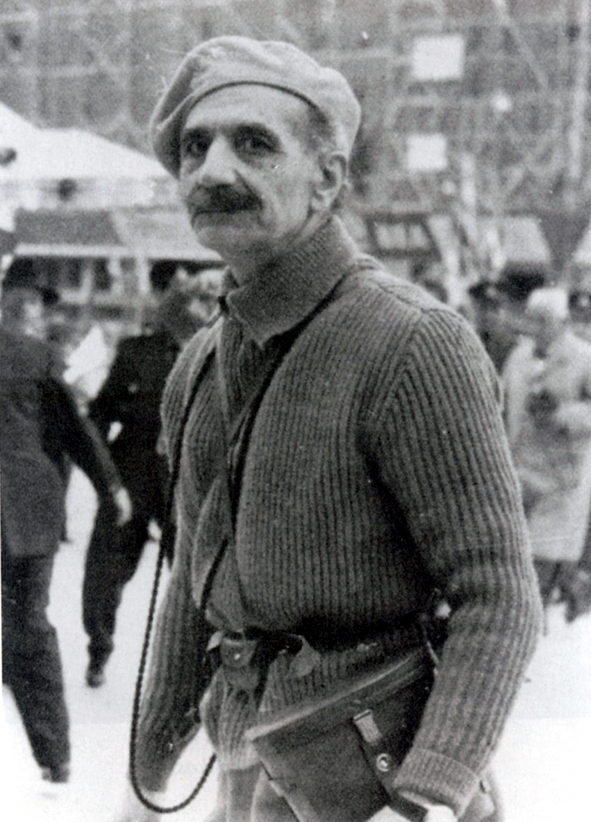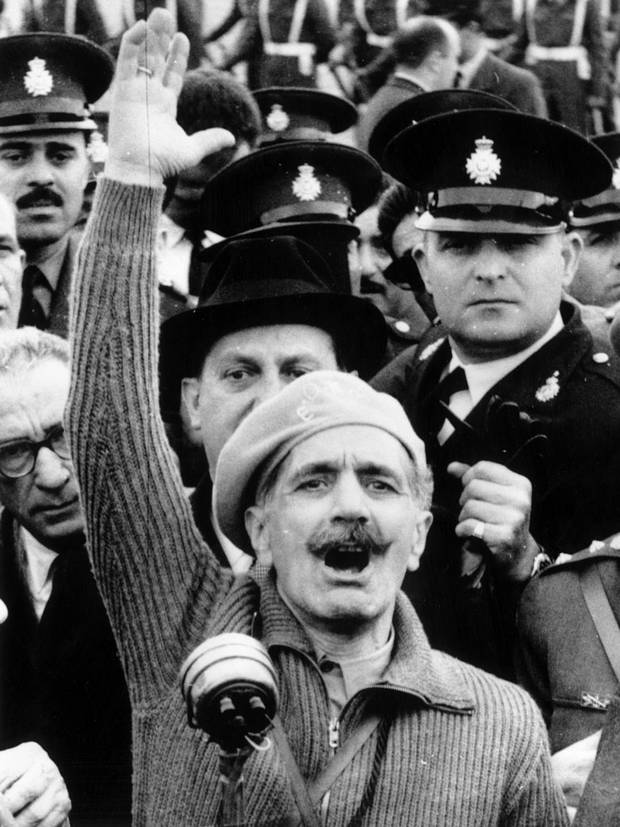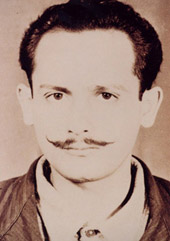<Back to Index>
- General of the Greek Army Georgios Grivas (Γεώργιος Γρίβας "Διγενής"), 1898
- Freedom Fighter Andreas Zakos (Ανδρέας Ζάκος), 1931
PAGE SPONSOR


Georgios Grivas (George Grivas; Greek: Γεώργιος Γρίβας) (July 5, 1898 - January 27, 1974), also known by his nom de guerre Digenis (Διγενής), which he adopted while in EOKA, was a Cyprus born general in the Greek Army, leader of the EOKA guerrilla organization and EOKA B paramilitary organization.
Georgios Grivas (a.k.a. Digenis) was born on July 5, 1898 in Trikomo, Famagusta District, the fourth child of Theodoros Grivas and Kalomira Hadjimichael. He grew up in his family home at Trikomo. After attending his village school he studied at the Pancyprian Gymnasium in Nicosia (1909 - 1915) where he stayed with his grandmother.
According to his obituary in The Times of London, his father intended him to become a physician. On learning this, Grivas fled his home and Cyprus in 1916 to study at the Athens Military Academy. He completed his military studies at the École Militaire in Paris. He graduated in 1919 with the rank of sub-lieutenant and was immediately posted on the Asia Minor front. Grivas served in the 10th Division of the Greek Army and participated in its advance from İzmir to Panormos and Eskişehir, past Bursa and the Sakarya River. With the subsequent rout and defeat of the Greek Army and its complete withdrawal from Asia Minor in 1922 he was placed at Redestos, Thrace. He was decorated for his bravery and promoted to lieutenant. He was later selected to study at the French Military Academy and upon his return to Greece he served in a number of posts, including that of a lecturer at the Military School of Greece. He was promoted to captain in 1925 and to major in 1935. Two years later he married Vasiliki Deka, the daughter of a pharmacist, in Athens.
With the beginning of World War II Grivas was transferred to the operations department of the central headquarters of the Greek army, working on the northern Greece's strategic defense plans. Three months after the Italian attack on Greece, Georgios Grivas was transferred to the Albanian front as chief of staff of the 2nd Division where he arrived in December 1940.
During the German - Italian - Bulgarian occupation of Greece in World War II he founded and led the Organization X, a minor nationalist organization made up of officers of the Greek army whose influence was limited in certain neighborhoods of Athens. During the events of December 1944, members of Organization X (the weapons were recovered from the German army in their retreat from Greece) fought at the Theseon alongside British and Greek monarchist forces to take control of Athens from EAM / ELAS fighters. The accusation that Georgios Grivas collaborated with the German forces is a falsification of some British writers which was adopted (see "O Grivas kai i X - To Xameno Arxeio - Spyros Papageorgiou - 2004 - Nea Thesis - Athens). In 1946 he retired from the Greek army on his own request but his subsequent attempts to enter politics were unsuccessful.
Thereafter Grivas focussed on the idea of liberating
Cyprus from British colonial rule and the aim of Union
with Greece (Enosis). As a member of the secret Committee
for the Cyprus Struggle he took the oath of Enosis
together with the newly elected Archbishop
Makarios III, with whom he collaborated for preparing the
armed struggle. He arrived secretly in Cyprus in November
1954 and began immediately the formation of his guerrilla
organization EOKA. On April 1, 1955 with a declaration
that he signed as DIGENIS and a number of explosions in
the four major cities and military installations, he
announced the beginning of his campaign for Self
Determination – Union with Greece.
He directed the first EOKA operations from his hideout in Nicosia but soon after he moved to the Troodos mountains to lead his guerrilla teams. He recruited Grigoris Afxentiou as one of the team leaders, initially of the Famagusta district. Grivas escaped capture twice after he was surrounded by British forces at Spilia in December 1955, leading to the Battle of Spilia, and at Kykkos in May 1956. A month later, chased by the British forces, he was secretly transferred from the mountains by the car of a passionate EOKA fighter, Kostis Efstathiou, widely known as Pachykostis, and found refuge in a hideout at Limassol from where he directed not only the military activities but also the political campaign, since Archbishop Makarios in March 1956 was exiled by the authorities.
During the struggle, the British colonial administration had offered a reward of 10,000 British pounds plus passage to anywhere in the world for information leading to the arrest of Colonel Grivas.
With the signing of the Zurich - London agreements in early 1959 and the declaration of Cyprus as an independent state Grivas reluctantly ordered a ceasefire, since the struggle's main objective of Enosis was not achieved. His views were at odds with those of Makarios who had accepted the above agreements on behalf of the Greek Cypriot population. In March 1959, Digenis came out of his hideout and departed (in exile, requested by the UK as part of the cease fire agreement) for Athens where he received a hero's welcome as the liberator of the Greek Cypriots and was subsequently decorated with the highest honors by the Greek Parliament and the Athens Academy and promoted to the rank of General. Not long after his return general Grivas was persuaded to head a coalition party but soon abandoned this route after the disappointing percentage his party obtained in the general election of 1963.
He returned to Cyprus in 1964 after the outbreak of inter - communal violence between Turkish Cypriots and Greek Cypriots to take over the Supreme Command of the Greek Cypriot forces organized under Makarios's National Guard as well as the Greek military division sent to Cyprus by the government of George Papandreou to assist in the island's defense against a possible Turkish attack. He directed the construction of defense forts and complexes aiming at withstanding a Turkish invasion. On 15 November 1967, Greek Cypriot National Guard under his direct command overran two small villages on the critical Larnaca, Limassol, Nicosia intersection, resulting in the deaths of 27 people, mostly unarmed Turkish Cypriot civilians as well as Turkish Cypriot resistance fighters at Kofinou and Agios Theodoros. The immediate result of this event was Turkey's ultimatum, which prompted the Greek military government to recall both the Greek Division and General Grivas to Athens.
From 1968 to 1969 and while under strict surveillance he
participated in a resistance movement aiming at deposing
the ruling military Junta and restoring democracy in
Greece, along with a number of Greek Army officers
including Colonel Dimitrios Opropoulos
and Majors Spyros Moustaklis, Nikolaos
Lytras and George Karousos
as well as Greek Cypriot students and professionals many
of them former EOKA fighters. Grivas began the formation
of armed resistance cells in a number of neighborhoods in
Athens which were armed with guns and explosives that were
brought in secretly from Cyprus. The organization,
however, was discovered by the authorities and many of its
members were arrested.
After the discovery of his plans by the authorities he secretly returned to Cyprus where he formed the armed organization EOKA B which he used as leverage in his attempts to persuade or force President Makarios to change his policy and adopt the line of "Self Determination – Union" with Greece. EOKA B failed to overthrow Makarios but the armed struggle led to a vicious circle of violence and anti - violence which amounted to civil war among the Greek - Cypriot Community from 1971 - 1974.
He died of heart failure at the age of 75 on January 27, 1974 while in hiding in a house in the city of Limassol. The post - Grivas EOKA B signed a secret agreement with Brigadier Ioannides, the "invisible dictator" of Greece and was controlled directly from Athens. Grivas' funeral and burial was held on January 29, 1974, in the garden of the house that had been Grivas' last hideout during the EOKA struggle (1955 - 1959) and attended by tens of thousands of Greek Cypriots. Upon his death, the Cypriot Government declared a three day official mourning and three days later, the Cypriot Parliament declared General Grivas "a worthy son of the motherland". The government of Archbishop Makarios, the target of Grivas' campaign for enosis, formally boycotted the event.
The Second Junta of Greece of the"invisible dictator"
Brigadier Demetrios Ioannides overthrew Makarios just six
months after Grivas' death. Ioannides was planning to
overthrow Makarios from the Spring of 1974 but the final
decision to do so was taken on July 2, 1974 after Makarios
decided to oppose directly the Ioannides regime and expel
from the Cypriot National Guard 550 Greek officers. That
would mean the loss of the military control of Cyprus for
Greece as well as the humiliation of Ioannides (Secret
Minutes of conversation between Makarios and British Prime
Minister - London 17 July 1974). The military coup of July
15, 1974 which overthrew Makarios was executed by forces
of the Cypriot National Guard under direct instructions
from Greece. The National Guard was led by Greek officers
and consisted of Greek Cypriot conscripts. The EOKA B
members and other pro-enosis forces joined the National
Guard in the afternoon of Monday July 15, 1974 in the
fight against Makarios forces. The coup was swiftly
followed by the Turkish
military invasion of Cyprus on Saturday 20 July
taking by surprise Ioannides who failed to prepare Cyprus
for a Turkish invasion and in addition failed to coerce
the Greek generals that he had appointed to apply "Plan K"
and assist militarily Cyprus. The loss of the "war of
Cyprus" marked the downfall of Ioannides.

Andreas Zakos was a Cypriot EOKA fighter during the 1955 - 1959 struggle against the British.
Zakos was born on November 12, 1931, in the village of Linou, Lefkosia province but was brought up in Lefka. He was employed at Cyprus Metallurgical Works but when the struggle broke out he joined EOKA. On December 15, 1955, his group joined Markos Drakos' team for an ambush against a British detachment, led by Major B. J. Coombe, near Mersinaki, close to ancient Soloi. In the ensuing battle of Soloi, Zakos was injured and captured by the British.
Zakos was convicted by the British colonial court and sentenced to death. He was executed by hanging on August 9, 1956, along with his friend Charilaos Michail (also captured at Soloi) and Iakovos Patatsos, who was captured in a separate incident. The three men are buried in the Imprisoned Tombs of the Central Jail of Nicosia.